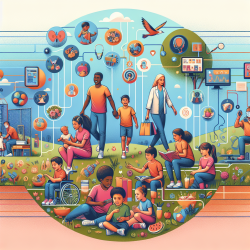In the realm of special education, particularly when addressing the needs of language and learning-disabled children, the quest for effective, engaging, and meaningful teaching strategies is ongoing. One noteworthy approach that has stood the test of time is outlined in the research article, Conceptbuilding: Developing Meaning Through Narrative and Discussion (1992) by Peg Reichardt. This method offers a comprehensive framework for enhancing concept knowledge, which is crucial for children's academic and social success. As a Special Education Director, I've seen firsthand the transformative impact that innovative approaches like Conceptbuilding can have on our students. Let's delve into how this method can improve practice and encourage further research among practitioners.
At its core, Conceptbuilding leverages the power of narratives and discussions to foster understanding of spatial, temporal, quality, quantity, and social-emotional relationships. This approach is grounded in the "shared activity model," which emphasizes routine and a shared communicative context as pivotal elements in learning. Through contrived oral concept stories, interactive story discussions, reasoning questions, imagery, and drawing representations, children are guided to a deeper understanding of concepts that are vital for their language and cognitive development.
What sets Conceptbuilding apart is its holistic approach to learning. Instead of isolating concept vocabulary words, it integrates them into a natural story/discussion context. This not only makes learning more engaging but also mirrors the way children naturally acquire language and concepts from their environment. Additionally, the method encourages children to create their own story imagery and organize their thoughts, further solidifying their understanding and ability to communicate concepts effectively.
The benefits of Conceptbuilding are manifold:
- Enhanced Narrative Skills: By engaging with stories, children improve their ability to structure narratives, a key component of effective communication.
- Improved Reasoning: The method's emphasis on reasoning questions helps children develop critical thinking skills, enabling them to understand cause and effect, make predictions, and draw conclusions.
- Flexibility and Creativity: With stories that offer optional endings and the encouragement to create their own concept stories, children are empowered to use their imagination and think creatively.
- Language Disorder Remediation: Conceptbuilding has shown promise in remediating various language disorders, including difficulties in morphology, syntax, narrative development, reasoning, and question comprehension.
Implementing Conceptbuilding in a classroom or therapy setting requires a thoughtful approach. Here are some strategies for practitioners looking to adopt this method:
- Integrate Stories with Curriculum: Align the concept stories with topics currently being covered in the classroom to reinforce learning.
- Encourage Group Discussions: Facilitate group discussions following story sessions to enhance social-emotional learning and collaborative problem-solving skills.
- Utilize Visual Aids: Employ drawing and imagery as tools for children to express their understanding and perspectives on the concepts discussed.
- Create a Routine: Establish a consistent routine for storytime and discussion, which helps children anticipate and prepare for learning in a structured environment.
For special education professionals seeking to enrich their teaching repertoire, Conceptbuilding offers a proven, dynamic approach to concept knowledge development. By embracing narratives and discussions as central to learning, educators can foster a more inclusive, engaging, and effective learning environment for all students.
In conclusion, the Conceptbuilding approach provides a valuable framework for enhancing concept knowledge through narrative and discussion. Its holistic, engaging, and flexible methodology makes it an ideal tool for special education practitioners aiming to improve their skills and encourage further research in this area. For those interested in exploring this approach further, I highly recommend delving into the original research article for a deeper understanding of its principles and applications.
To read the original research paper, please follow this link: Conceptbuilding: Developing Meaning Through Narrative and Discussion (1992).










